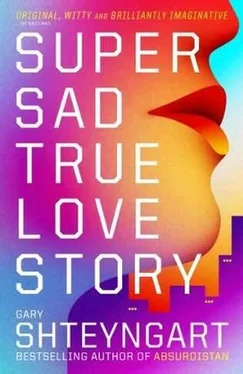I took Eunice’s arm and led her over my parents’ pristine lawn. At the door my mother appeared in her usual outfit-white panties and utilitarian bra-a woman who since taking her retirement had committed herself to intensive housebound living and whom I haven’t seen in proper dress for years.
She was about to throw her arms around my neck in typically overblown fashion when she noticed Eunice, let out some Russian garble of amazement, and retreated inside the house, leaving me, per the usual, with the visuals of her thick gravity-pulled breasts and white little round of belly. My father, shirtless, in stained beige shorts, soon took her place, also gaped at Eunice, ran his hand against his naked muscular breasts perhaps out of embarrassment, said “O!” then hugged me anyway. There was hair against my new dress shirt, the gray carpet that my father wore with an odd touch of class, as if he were a royal in some tropical country. He kissed me on both cheeks and I did the same, feeling the flood of intimacy, of sudden closeness with a person who usually orbited so far away from me. The instructions, the Confucian-like code of Russian father-son relations, spooled in my mind: Father means I have to love him, have to listen to him, can’t offend him, can’t hurt him, can’t bring him to task for past wrongs; an old man now, defenseless, deserving of all I can offer.
My mother reappeared in shorts and a wife-beater. “Sinotchek” (“Little son”), she shouted, and kissed me in the same meaningful way. “Look who’s come to us! Nash lyubimeits ” (“Our favorite”).
She shook Eunice’s hand, and both of my parents swiftly evaluated her, affirmed that she was, like her predecessors, not Jewish, but quietly approved of the fact that she was thin and attractive with a healthy black mane of hair. My mother unwrapped her own precious blond locks from the green handkerchief that kept them safe from the American sun and smiled prettily at Eunice, her skin gentle and pale, aged only around the frantically moving mouth. She began talking in her brave post-retirement English about how glad she was to have a potential daughter-in-law (a perennial dream-two women against two men, better odds at the dinner table), filling in the contours of her loneliness with rapid-fire questions about my mysterious life in faraway New York. “Does Lenny keep clean house? Does he vacuum? Once, I came to college dormitory, okh, awful! Such smell! Dead ficus tree! Old cheese on table. Socks hanging in window.”
Eunice smiled and spoke in my favor. “He’s very good, Ms. Abramov. He’s very clean.” I looked at her with endearment. Somewhere beneath the bright suburban skies I felt the presence of a.50-caliber Browning gun swiveling toward an incoming Long Island Rail Road train, but here I stood, surrounded by the people who loved me.
“I got Tagamet from the discount pharmacy,” I said to my father, taking five boxes out of the bag I’d brought.
“Thank you, malen’kii ” (“little one”), my father said, taking hold of his beloved drug. “Peptic ulcer,” he said to Eunice gravely, pointing at the depth of his tortured stomach.
My mother had already grabbed hold of the back of my head and was madly stroking my hair. “So gray,” she said, shaking her head in an exaggerated way, as if she were an American comedic actress. “So old he gets. Almost forty. Lyonya, what is happening to you? Too much stress? Also losing hair. Oh my God!”
I shook her off. Why was everyone so concerned about my decline?
“You are named Eunice,” my father said. “Do you know where it come from, such name?”
“My parents…” Eunice gamely began.
“It from the Greek, yoo-nee-kay . Meaning ‘victorious.’” He laughed, happy to demonstrate that, before he was forced to be a janitor in America, he had served as a quasi-intellectual and minor dandy on Moscow’s Arbat Street. “So I hope,” he said, “that in life you will be victorious also!”
“Who cares about Greek, Boris,” my mother said. “Look at how she is beautiful!” The fact that my parents admired Eunice’s looks and capacity for victory brightened me quite a bit. All these years, and I still craved their approval, still longed for the carrot and stick of their nineteenth-century child-rearing. I instructed myself to lower the heat of my emotions, to think without the family blood bursting at my temples. But it was all for nought. I became twelve years old as soon as I passed the mezuzah at the front door.
Eunice blushed at the compliments and looked at me with fear and surprise, as my father began to lead me to the living-room couch for our usual heart-to-heart. My mother rushed over to the couch with a plastic bag which she draped over the place where I was about to sit in my compromised Manhattan outerwear, then took Eunice to the kitchen, chatting gaily to the potential daughter-in-law and ally about how “guys can be so dirty, you know,” and how she had just built a new storage device for her many mops.
On the couch, my father draped his arm around my shoulders-there it was, the closeness-and said, “ Nu, rasskazhi ” (“So, tell me”).
I breathed in the same breath as he did, as if we were connected. I felt his age seep into mine, as if he were the forward guard of my own mortality, although his skin was surprisingly unwrinkled, and he bore an odor of vitality on his skin, along with an afterthought of decay. I spoke in English with the tantalizing hints of Russian I had studied haphazardly at NYU, the foreign words like raisins shining out of a loaf. I mentally recorded some of the harder words for consultation with my non-digital Oxford Russian-English dictionary back home. I spoke about work, about my assets, about the 239,000 yuan-pegged dollars I owed Howard Shu ( “Svoloch kitaichonok” [“Little Chinese swine”], my father rendered his opinion), about the most recent, fairly positive valuation of my 740-square-foot apartment on the Lower East Side, about all the monetary things that kept us fearful and connected. I gave him a photocopy of who I was, without telling him that I was unhappy and humiliated and often, just like him, all alone.
He held up the pendant of my new äppärät. “How much?” he said, turning the thing over, varicolored data pouring over his hairy fingers. When I explained that the device was gratis, he made a happy snort and said in pure English: “Learn new technology for free is good.”
“How’s your Credit?” I asked him.
“Eh.” He waved the thought away. “I never go near those Poles, so who cares?”
The floor beneath my feet was clean, immigrant clean, clean enough so that you understood that somebody had done their best. My father had two old-fashioned televizor screens stapled to the walls above my mother’s fanatically waxed mantelpiece. One was set to a FoxLiberty-Prime stream, which was showing the growing tent city in Central Park, now spreading from the backyard of the Metropolitan Museum, over hill and dale, all the way down to the Sheep Meadow ( “Obeyziani” [“Monkeys”], my father said of the displaced and homeless protesters). On the other screen, FoxLiberty-Ultra was viciously broadcasting the arrival of the Chinese Central Banker at Andrews Air Force Base, our nation lying prostrate before him, our president and his pretty wife trying not to shiver as a bleak Maryland downpour scoured the heat-cracked tarmac.
When I asked my father how he was feeling, he pointed at his heartburn and sighed. Then he began to talk about the news on “the Fox.” Sometimes when he spoke I surmised that, at least in his own mind, he had already ceased to exist, that he thought of himself as just an empty spot cruising through a ridiculous world. Speaking in the complicated Russian sentences that English had denied him, he praised Defense Secretary Rubenstein, talked about all that he and the Bipartisan Party had done for our country, and how, with Rubenstein’s blessing, SecurityState Israel should now use the nuclear option against the Arabs and the Persians, “in particular against Damascus, which, if winds are properly positioned, s bozhei pomochu [‘with the help of God’], will carry poison clouds and fallouts in direction of Teheran and Baghdad,” as opposed to Jerusalem and Tel Aviv.
Читать дальше












